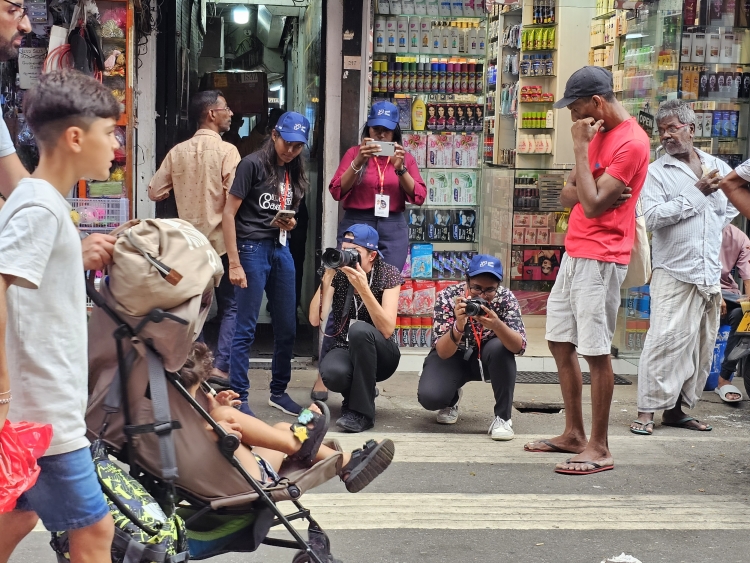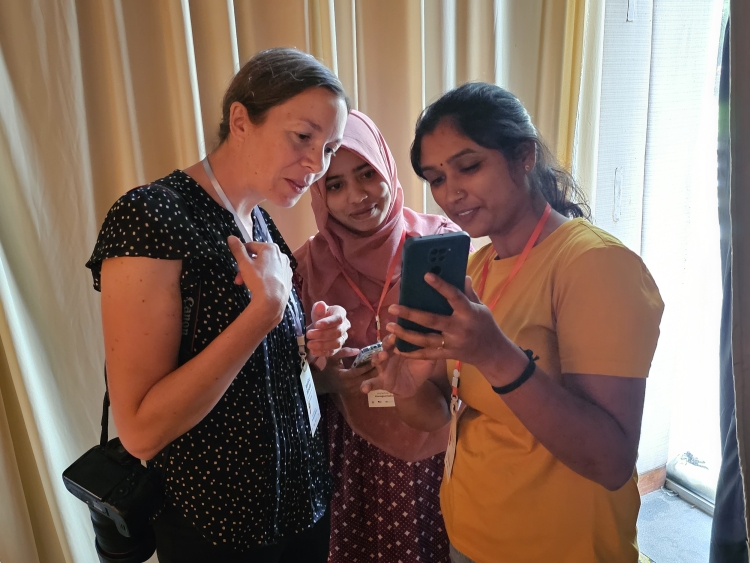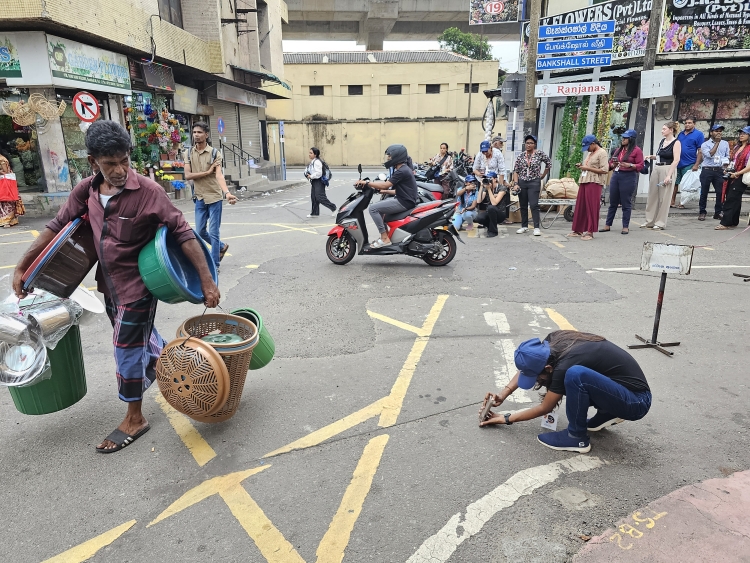On any given day at a press conference in Sri Lanka, “almost everybody operating a camera is male,” said journalist Dilushi Wijesinghe.
An annual photo contest in the country, organized by the U.S. Embassy, has drawn submissions from almost all men in recent years.
And Wijesinghe herself is the only woman photojournalist at her newspaper.
“We don’t see a lot of female photojournalists in Sri Lanka,” said Wijesinghe, who works for The Sunday Times in Colombo. “Generally speaking, women – not just photojournalists – they’re quite known to be belittled and not taken seriously.”
It’s a situation that Wijesinghe and others like her in Sri Lanka are changing – by picking up cameras and shooting.

Wijesinghe was one of two dozen women journalists who took part in a recent photojournalism training organized by the International Center for Journalists (ICFJ) and the Sri Lanka Press Institute (SLPI), with support from the U.S. Embassy in Colombo. Jessica Rinaldi, a Pulitzer Prize-winning photographer from The Boston Globe, led the three-day training for professional journalists, along with a two-day training for women university students that drew 59 participants later in the week.
“This is a really good opportunity for all the female photojournalists, not just in Colombo but all around the country, to engage, to grab whatever Jess has to offer,” Wijesinghe said.
ICFJ and SLPI decided to hold the sessions after only a few women applied for an earlier photojournalism training. This time, more than 300 professional women journalists applied to take part.
Over the course of three days, Rinaldi covered everything from composition, light and photo stories to ethics and safety – and hit the streets every afternoon to shoot photos with the journalists. The exercise allowed them to immediately put into practice the tips and techniques they were learning. The next day, the group reviewed what they had shot.
“My capacity to understand, to observe, it expanded,” said Subhashi Tania de Silva, a participant and freelance writer. She also learned that “as a photojournalist, always you have to interact and be connected with the subject” – a point Rinaldi emphasized.
“You want your viewers to connect with the subject,” Rinaldi told the group. “In order to do that, you need to connect with the subject.”
She also spoke of the power of photography to tell the stories of your community and to move people to care. “How do I take something that is big,” she told the journalists to ask themselves, “and break that down to a very molecular, human level?”
Rinaldi shared that at the start of her career in the U.S. 24 years ago, she was often the only woman photojournalist covering an event, and felt a need to prove herself. U.S. Ambassador Julie Chung, in remarks kicking off the week, said she often faced challenges as a diplomat in male-dominated spaces, and told participants she hoped working with Rinaldi would encourage them “to pursue a path that you might have hesitated treading before.”
Wijesinghe said Rinaldi showed her that photographers can do their work – and perhaps even do it better – without being in the spotlight or well-known, and that it is not necessary to study photography in depth, she said. Rather, the best way to improve is to get out and shoot.
“I’m pretty sure that I speak on behalf of all the women that are here when I say that she has really been an inspiration,” Wijesinghe said.

The trainings are part of a five-year ICFJ program, supported by the embassy, designed to advance investigative journalism in a country living in the aftermath of a 26-year civil war and a devastating, ongoing economic crisis. More than 490 journalists have taken part, deepening their knowledge and skills on a range of topics: digital and physical security, open-source intelligence reporting, data journalism and more.
In all the programming, ICFJ and SLPI have made it a priority to bring together journalists from various parts of the country and ethnic backgrounds. To that end, every training includes live interpretation not only in Sinhalese – spoken by Sri Lanka’s majority ethnic group – but also in Tamil.
“Journalists and young, aspiring journalists are learning from people who are actually exposed to the current techniques, skills and technology, that have widely been used in the modern environment, and that knowledge has been transferred to them in a local context, and it is not limited to just a few, but it is actually available to many others who may not have the opportunity (otherwise),” said Kumar Lopez, the CEO for SLPI.

Beyond the training, Lopez encouraged the journalists to stay connected and form a support system. “We want to build a stronger forum of women photojournalists,” he said.
De Silva said she was grateful for the opportunity to connect, share and learn.
“In this space I found people who are around my age, who are just like me,” de Silva said. “It felt really good to empower each other.”
During the training, participants shot photos on the streets every afternoon with Rinaldi. Here are some highlights.